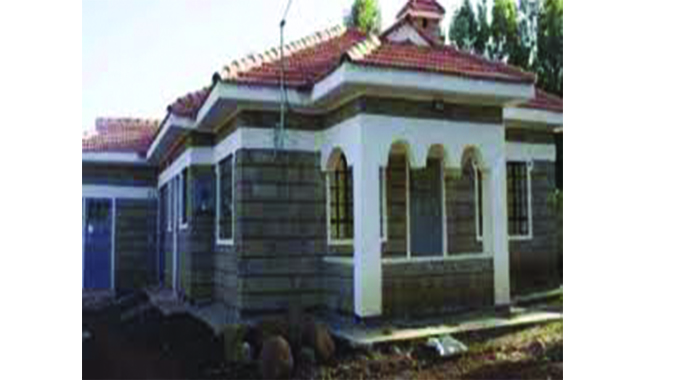CPU and Sizimele partner to rebuild houses

Oliver Kazunga, Senior Reporter
THE Civil Protection Unit (CPU) and a local Non-Governmental Organisation, Sizimele, have partnered to reconstruct houses for 15 families in Maphisa, Matobo District whose homesteads were destroyed by violent storms early this year.
The houses were destroyed following above-normal rains the area received in Tjehondo under Chief Fuyana.
When this news crew visited Tjehondo Village in Ward 10 at one of the homesteads affected by the calamity, a newly built two-roomed house had been erected with roofing and plastering all complete, making it habitable.
Builders at the homestead were plastering a toilet.
An ecstatic Mr Precious Moyo, the owner of the new house said: “We are happy over the kind of assistance that we have received from the CPU and Sizimele because life had become miserable and difficult for us because on our own, we could have not recovered from the disaster to where we are right now.
“Following the disaster that befell us, as a family all our belongings including food and clothes were destroyed by water. We are really thankful for the assistance that we have received.”
His wife Thembalami Buhlalo, a mother of nine, echoed similar sentiments, adding that the gesture shown by the CPU and Sizimele should not only end with them but be extended to others as well.
“Had it not been their intervention to our charity case, as a family we were not going to be able to build a structure like this one you are seeing here today. So, as a family we are really grateful for the kind of assistance that has been rendered to us, and it’s my clarion call that this kind gesture should not only end with us here, let it be extended to others in a similar situation as ours,” she said.
In an interview in Kezi on the sidelines of the launch of the 2021 Winter Wheat Cropping Programme in Matabeleland South province at Valley Irrigation Scheme by the Ministry of Lands, Agriculture, Fisheries, Water and Rural Resettlement on Thursday, the district development co-ordinator Mr Obey Chaputsira said: “As a district, we were affected by the above-normal rainfall that we received in the past season and as a result, a number of households were affected by the rains, especially around February.
We had to carry out an assessment in the 24 wards of the district where we came up with 15 households that were severely affected. As such, we had to present a report to a number of partners and fortunately, Sizimele came through to assist us in the 15 households that we had identified.”
For the 2020/2021 rain season, the Meteorological Services Department predicted normal to above-normal rainfall characterised by flash flooding, violent storms, tropical cyclones, floods in low-lying areas and storms across the country.
Mr Chaputsira said in the previous season the district received above-normal rainfall of over 800mm against a normal of between 350mm and 450mm.
The CPU and Sizimele have constructed new houses for the affected villagers and the structures were close to 80 percent completion.
“Currently, we are reconstructing the 15 homes and we are constructing two-roomed houses and a toilet for each of the affected households. After their houses were destroyed, they didn’t have anywhere to stay, some were now staying with neighbours or relatives. Two households were provided with tents because they didn’t have anywhere else to stay so, we had to give them tents so that they are provided temporary shelter.
Mr Chaputsira said it was important to build houses for affected villagers to restore their dignity.
“I am glad to say that most of the houses are around 80 percent complete. We have one which is in Ward 14 which is already complete and the family has moved in. But others houses are just left with finishing touches and we believe that by 15 June (today) all the families should be back in their homesteads where they were before.”
He said one of the families has been relocated because they had constructed their homestead in a water way.
“The family was moved to a different place but still under the same village there because they had initially built their homestead in a water way and had not engaged an agricultural extension worker for technical advice,” he said.
The affected families have also been assisted with non-food items such as buckets, blankets and US$18 per individual up to a maximum of five people per homestead.
The money, Mr Chaputsira said, was meant to enable the families to buy some of the items the benefactors could not supply such as food.
“We are also in the process of distributing educational material not only to those households but to others that were equally affected. We are giving them textbooks, exercise books and a number of other educational materials because we want to believe that some of the items were destroyed during the rainy season and we want the children to go back to school,” he said.
Mr Chaputsira said they established that although the houses were constructed using bricks, they got ruined by the violent storms mainly on account that the structures did not have mortar mixed with cement.
“Also, the climate is changing and you find that the structures that are now required should be standard buildings and most of the houses that were destroyed were constructed long back,” he said. — @okazunga.










Comments